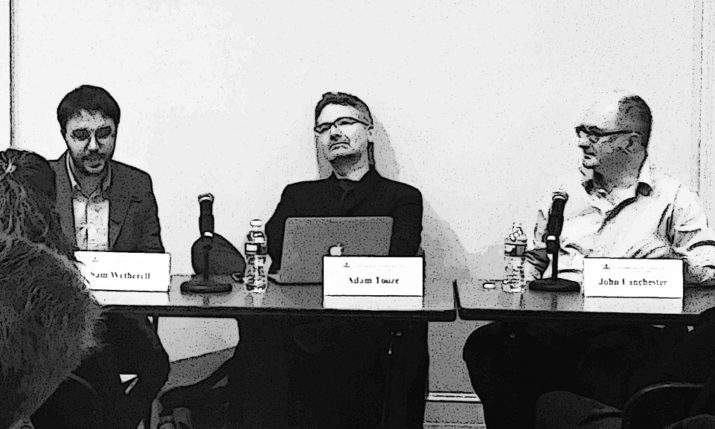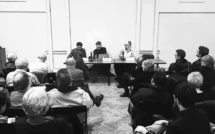

It’s an interesting time to hold a Brexit conference in the United States. The recent elections in the U.S. have catapulted the country into one that, if possible, has become even more obsessed with itself. In the thirty or so days that have passed since November 8th, I have seen little to no headlines on front pages that addressed the news outside of these borders. More so than ever, the world outside the U.S. seems to have stopped to exist for those living inside it.
With this sudden urgency pressing on people’s minds, the U.S. might be forgiven for forgetting the other urgency that took place a few months ago in the U.K. In the frenzied news cycle that this election has produced, a single day can produce as many mind boggling breaking news stories as previously ran in a year. Each day resembled what a whole year must have felt like in 1972, with newspapers showing a new Watergate with every edition. So what can a piece of writing add in a world where there is already too much noise for us to listen properly?
One of the better things on Brexit was written by John Lancester, who was also the respondent for Brexit: Before and Beyond His “Brexit Blues” in the London Review of Books starts with an explanation of the “Overton window,” a concept in political science that describes the range of ideas that are deemed acceptable by the public at one time. The crucial insight of Joseph Overton, the inventor who lent his name to the concept, was that this window of acceptability could be shifted.
An idea can start far outside the political mainstream–flat taxes, abolish the IRS, more guns in schools, building a beautiful wall and making Mexico pay–but once it has been stated and argued for, framed and restated, it becomes thinkable.
“An idea can start far outside the political mainstream–flat taxes, abolish the IRS, more guns in schools, building a beautiful wall and making Mexico pay–but once it has been stated and argued for, framed and restated, it becomes thinkable,” Lancester writes. After this period of shift, “the window has moved, and rough beasts come slouching through it to be born.”
If the American newspapers had been able to take their eyes off of Trump during the election cycle, and looked across the ocean, they might have noticed that Brexit was widening the window for the beasts to slouch through. The least expected could have been foreseen if Americans had looked more closely to what their English neighbors failed to see coming. If a conference on Brexit could serve one purpose, it would be to show the American audience what the U.K. is dealing with already.
They could study the scene set by the first speaker, Christian Lequesne, professor of European politics at Sciences-Po and the director of the Centre d’Etudes et de Recherches Internationales. He described a not so united kingdom whose government has landed in a legal fight over the execution of Brexit before it has proposed any concrete plans of how to do so, and whose people can’t agree on whether to do a “soft exit” that allows money and goods in but not the people, or to pursue a ‘hard exit’ that would cut off all ties. The separation will probably not be realized before March 2019, when the next European election is up. Enough time for ‘Regrexit’ to settle in.
But what if, instead of just looking from the U.S. to the U.K. and the other way around, we look from outside the West completely? The West is only now starting to doubt the functioning of its democracy, but it’s something that has long been clear for many living outside these democracies. How admiring were Palestinians of America’s democracy when president Obama donated 38 billion dollar military aid to Israel to ensure it’s protection in, what he called, “a dangerous neighborhood?” How impressed were Iraqi’s with British democracy when British troops invaded their country, whose borders the Brits had drawn themselves in eighty years prior?
Harvard professor Yascha Mounk spoke about the essential mistake the West made: seeing their democracy as the only option. Mounk explained how political scientists have always understood Democracy as an one way street: it was considered the natural end-goal towards which all progress gravitated. Once reached, wealthy democracies would remain stable, and “democracy would become the only game in town.”
Political scientists, and the Western media, are now slowly realizing that that’s not the case. In fact, it has become quite a popular idea to criticize democracy for not delivering the right results. In May, Andrew Sullivan wrote in New York Magazine that “America has never been so ripe for tyranny.” The tagline of the article was: “Democracies end when they become too democratic”. Caleb Crain wrote in New Yorker, one day before November 8th, about “The Case Against Democracy.” Even Columbia’s President Lee Bollinger warned for the dangers of democracy during this year’s commencement ceremony. The wars that have come out of the Arab Spring contributed to this doubt, and the fact that what many clearly see as a bigot has been elected into America’s highest office, democratically.
Mounk argued that we need to stop seeing democracy as the end-point, but merely as a step into a longer game. What we’re moving towards is a place where old values that made us feel good about ourselves no longer resonate.
Mounk argued that we need to stop seeing democracy as the end-point, but merely as a step into a longer game. What we’re moving towards is a place where old values that made us feel good about ourselves no longer resonate. Younger citizens ascribe less importance to democracy than the older generation, and in the whole of Europe, faith in the democratic system is declining while openness to authoritarian rule is growing. Not only liberal politicians, the press, or the left need to reinvent themselves, but even political scientists are facing an existential dilemma. How is it possible that people seem to be choosing to move away from a system they previously agreed on as the highest ideal?
Columbia professor and political theorist Turkuler Isiksel, provided a poignant case study. Estonia, a recent E.U. member that might easily be the whitest country in the union, is home to a population who quoted immigration as one of the biggest challenges facing the E.U. Terrorism came in on second place. According to a recent census, non-European migrants consisted of only 1.1 percent of Estonia’s population, while the country was home to a total number of only 31 Africans and African-Americans. These results turned out to be representative to other countries in the European Union, including the U.K. When asked what affected them personally, countries like these quoted pensions and the economy, yet, those weren’t the benefits or downsides they felt the E.U. addressed. In brief, the threat of other people coming in was bigger than whatever money was lost. The threat was felt in identity, not economy.
Indeed, an institution like the E.U., one that was designed to maintain the stability of their world, is now blamed for problems beyond its reach. Isiksel provided a suggestion as to why this was happening. The E.U. was designed in its origin to surpass the identity politics that ravaged Europe before the union’s founding. Instead, common economic interests would dull the craving for national grandeur. The fact that no one felt that the European Union spoke to them was exactly the point—the way the E.U. has been packed and sold excludes any bottom line loyalty. But the generation that remembers the war-ravaged Europe is shrinking, and exactly now war has become unthinkable, the generation of peace is abandoning the union that has made that possible.
Europe as one identity is losing power, and Brexit serves as the reminder that also America is just a collection of states that only sometimes agree. If anything, the mission of an institution with as many resources as Columbia is exactly to make sure that work is produced to reminded us of that. Columbia University is one of those bubbles that has prevented many from seeing Brexit and the Trump presidency coming, but it’s exactly because it is one of the most elite colleges in America’s most wealthy and progressive metropole that gives it the responsibility to ask questions that reach beyond the campus walls. The most potent one came from John Lanchester, who was sitting in the audience. He asked the panelists, “Will the European Union still exist in five years time?”
Mary Wang is a Chinese-Dutch writer based in New York. Currently, she’s working on a book project that explores Chinese medicine as one of China’s most successful export products.
Published on December 5, 2016.
Photo: The European Institute at Columbia University




